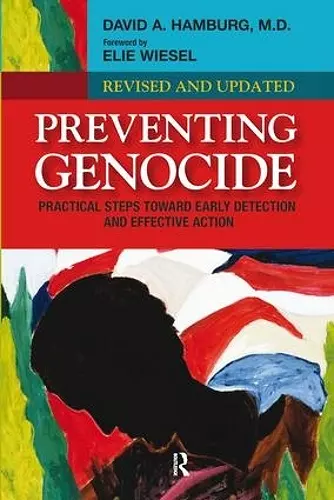Preventing Genocide
Practical Steps Toward Early Detection and Effective Action
Elie Wiesel author David A Hamburg author
Format:Hardback
Publisher:Taylor & Francis Inc
Published:30th Apr '08
Currently unavailable, and unfortunately no date known when it will be back
This hardback is available in another edition too:
- Paperback£41.99(9781594515583)

Genocide has been called 'a problem from hell' and despite vehement declarations of 'never again' it's a problem that continues to plague the world. From the beginning of history to the most recent massacres in Bosnia, Rwanda, and Darfur, genocide defies resolution. And given today's worldwide access to highly lethal weapons and advanced communications technology facilitating incitement to hate, we can expect to see this problem grow. It is often claimed that genocide occurs without warning, taking both local and global communities by surprise. Yet, as David Hamburg convincingly shows, we have had long-term advance knowledge of most modern genocides dating back to the early 20th century Armenian tragedy in Turkey and before. In this book, Dr. Hamburg applies a groundbreaking new perspective-the medical model of prevention-to the scourge of genocide in the world. Preventing genocide is not only possible, Dr Hamburg contends, but essential given its high cost in lives, human rights, and international security. Here he maps out numerous practical steps to recognise genocidal conflicts early and stem their tides of violence before they become acute. He also outlines several institutions in place and programs underway at the UN, EU, and NATO devoted to preventing future genocides before they erupt. He draws lessons both from missed opportunities and successful experiences and makes many constructive suggestions about strengthening international institutions, governments, and NGOs for this purpose.
Read the following editorial written by Dr. Hamburg that appeared in Science magazine:
"After millennia of mass exterminations, genocides such as those in Rwanda, Bosnia, and Darfur continue to plague the world. Given today's ready access to lethal weapons and technology-assisted incitements to hatred, the plague is poised to spread. How can we reverse this potential for malignant growth?
For decades, biological and behavioral sciences have explored factors in human conflict. But explicit focus on the prevention of mass violence, especially genocide, has lagged behind until recently. A finding of practical significance is that genocide-prone behavior can be foreseen years in advance, and this period of time could be used for prevention by applying pertinent knowledge and skills, mostly of recent origin.
Studies by international collaborators, mainly social scientists and policy analysts in universities, the United Nations, and several commissions, clarify what various organizations and institutions can do to build 'pillars of prevention' that can greatly reduce the risk of genocide and other mass violence. These pillars include preventive diplomacy (such as efforts by former United Nations Secretary-General Kofi Annan to resolve conflict in Kenya) and long-term measures, especially democratic governance, equitable socioeconomic development, and constraints on weaponry.*
The pillar of education is vital in this context. Educating societies about hatred and violence is an old story in human history. But there is a better way. For example, decades of research on intergroup contact show how age-appropriate education can help people to live together harmoniously, even across previously adversarial barriers. Such intergroup contact is most effective when imbedded in shared, mutually rewarding activities that are supported by relevant authorities with a mutual aid ethic and seen as a source of benefits for all--so-called superordinate goals. Such goals may enhance intergroup relations within a school or community but also help substantially in preventing mass violence. There is no more vivid example than the recognition by the United States and the Soviet Union that avoiding nuclear war was a superordinate goal that could only be achieved by cooperation. Could global problems of food, water, health, and climate be made superordinate goals for unfriendly groups or states to tackle cooperatively?
Just as lifelong learning in mathematics, science, and technology is essential for the success of a modern economy, so too the teaching of pro-social behavior across the life-span can help to prevent immense destruction. This involves explicit information and hands-on experience with conflict resolution, violence prevention, mutual accommodation between groups, and conditions conducive to peaceful living. Evaluations of programs that emphasize pro-social behavior have identified methods that effectively teach children in these areas. Both science education and peace education require periodic updating and reinforcement on a long-term basis, and curriculum reforms cannot afford to neglect the latter as a vital component of modern education.
Schools, universities, academies, and international organizations can work together to develop and disseminate curricular material to overcome ethnocentrism, prejudice, and predisposition to violent pseudo-solutions. Good examples of such collaboration are the InterAcademy Panel and InterAcademy Council. These multinational organizations of science academies were created to mobilize the scientific community on a worldwide basis to address global needs and opportunities by advising national governments and international bodies, including the United Nations and the World Bank. It is vital to understand throughout the world the nature of human diversity and the fact of our common humanity.
ISBN: 9781594515576
Dimensions: unknown
Weight: 635g
352 pages